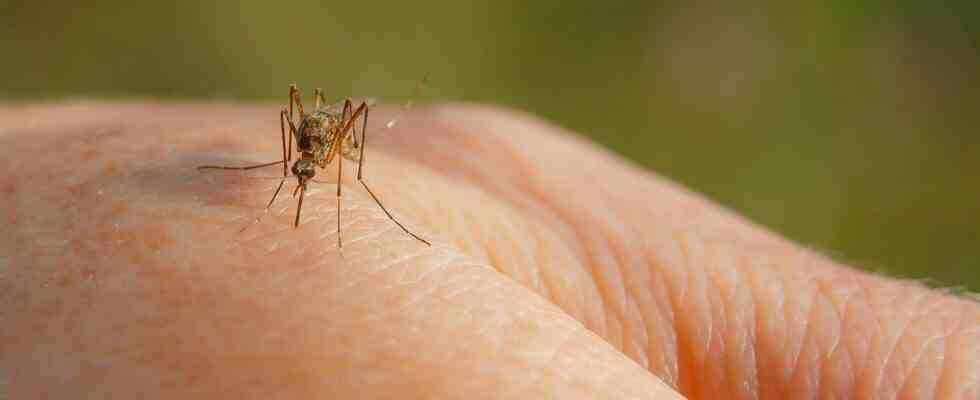febrile illness
Ten cases of the West Nile virus in Germany – what you should know about it
The common house mosquito serves as a so-called vector. She herself does not contract West Nile virus, but can transmit it to humans.
© Andrei Sauko / Getty Images
According to the Robert Koch Institute, ten people have already been infected with the West Nile virus in Germany this season. But there should be far more cases. How dangerous the disease is.
Let’s think of mosquitoes – these small, whirring pests were sometimes annoying. However, due to climate change, they can transmit tropical diseases. One of them is West Nile Virus. The number of proven infections with the West Nile virus among people in Germany has risen to ten this season. This emerges from a database of the Robert Koch Institute (RKI). For eight of those affected, Germany is specified as the country of infection, as an RKI spokeswoman told the German Press Agency. Further details were not initially known. At the end of August, the RKI announced the first human infection acquired in this country this summer. But what exactly is the West Nile virus?
What is West Nile fever?
The fever is caused by the West Nile Virus. The pathogen originally comes from Africa. It was first discovered in 1937 in the West Nile District of Uganda. According to the Friedrich Loeffler Institute, it was first detected in France in the 1960s. It is an endemic zoonosis that occurs in different regions of the world, as the RKI informs. The pathogen repeatedly reaches Europe and thus also Germany through migratory birds.
How is the virus transmitted?
However, humans cannot become infected with the virus from the migratory birds themselves. No, the mosquito is to blame. In Germany, Culex pipiens, i.e. the common house mosquito, is the most relevant carrier for transmission. But how exactly does the transfer work? “The mosquito bites the bird, absorbs the virus and can thus transmit it to humans. The mosquito acts as a vector – it is not infected itself, but transmits the virus,” explained biologist Felix Sauer in an interview with the star. At the Bernhard Noch Institute for Tropical Medicine, he researches mosquitoes and their potential to transmit diseases. West Nile fever is a so-called vector-borne disease.
How common is West Nile fever in Germany?
According to the RKI database, the reports so far this season have come from Berlin (3), Saxony (3) and Saxony-Anhalt (3) as well as North Rhine-Westphalia (1). Individual late registrations are still possible, as the RKI said. With ten cases so far, twice as many cases have been documented this year as in the previous season – but fewer than 2020, when 30 cases were known.
Compared to some southern European countries, the number of cases in Germany has so far been manageable: According to data from the EU health authority ECDC, around 950 cases of West Nile fever were recorded in this year’s transmission season – more than 570 in Italy and around 280 in Greece (as of March 2019). October 26). 72 deaths were registered.
Since when does the disease appear in Germany?
In 2019, the first infections suspected of being transmitted by mosquitoes became known in people in Germany who had not previously travelled. According to the RKI, transmission between mosquitoes and birds was documented in Germany for the first time in 2018, but the virus, which originally came from Africa, had probably reached Germany a few years earlier. It is assumed that the pathogen can now also hibernate here in mosquitoes.
How dangerous is West Nile virus infection?
The disease is usually uneventful. According to the RKI, around 20 percent of those infected develop a feverish and flu-like illness. Fever usually occurs abruptly – coupled with chills, headaches and back pain. Likewise, infected people may feel exhausted and have swollen lymph nodes. Due to the inconspicuous symptoms, which we also know from other diseases, very few cases are likely to be known. Experts assume a high number of unreported cases.
Only about every 100th infected person becomes seriously ill. Meningitis can develop, which can be fatal. Possible symptoms are a mental change, muscle weakness, flaccid paralysis or even epileptic seizures. Especially the elderly, people with cardiovascular disease and people with a weakened immune system are at higher risk of a severe course.
How is West Nile Virus treated?
According to the RKI, there is no special antiviral therapy to fight the virus. Therefore, the symptoms are treated.

